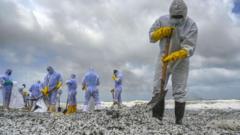In Dong Nai Province, Vietnam, the legacy of Agent Orange continues to affect lives decades after the Vietnam War. Nguyen Thi Ngoc Diem, born with a deformed spine and limbs attributed to her father's exposure to the toxic herbicide, had found a glimmer of hope with training funded by U.S. A.I.D. in graphic design. However, her optimism has been shattered as President Trump’s administration drastically reduced foreign aid, ceasing efforts to support those afflicted by the chemical's devastating effects.
Living with the repercussions of a conflict that severely impacted her and countless others, Diem expressed frustration at the U.S. abandoning its responsibility. She recalled the promised assistance, including the provision of a new computer and small loans, critical for her development. The reality she faces is stark; Trump's decision to freeze U.S. A.I.D. funding and dismantle key humanitarian programs continues to leave victims like her without essential resources.
"I had hoped for a new computer to enhance my work," Diem lamented, while using a dated device frequently plagued by technical issues. The absence of support feels particularly poignant for her, as she reflects on how the U.S.'s actions created a situation that left many in her community vulnerable. Her circumstances highlight a broader issue of accountability and morality regarding the U.S. involvement during the war and its enduring consequences.
As the once-promising assistance dwindles, many survivors of Agent Orange fear their struggles, which stem from the U.S. military’s past actions, will be forgotten. The question remains whether the American government will take action to honor its commitments towards those harmed by its controversial legacy.






















